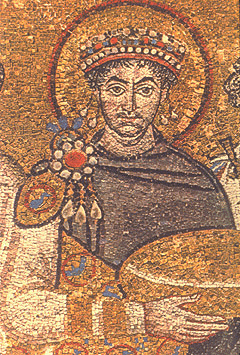
by Marjolein Schat
"Emperor Justinian I took power of a depleted Roman Empire in 527 C.E. Justinian?s goal was to restore the Roman Empire to her early glory, and rebuild the trade routes. The process of rebuilding the empire meant the formation and movement of vast armies, establishment of supply trains for the armies, and lots of funding. Justinian imposed heavy taxes on his citizens and re-conquered lands to help pay for his wars. Accounts of the wars given by Procopius (1914) suggest Justinian was making good progress in his attempts to restore the empire until 541 C.E. when plague broke out in the empire.
Descriptions of what appears to have been bubonic plague have survived from throughout ancient Roman history. Those reports were centered in the Levant (north of the Red Sea) and northern Africa, and described very high rates of mortality (Orent 2004). At this time, plague occurrences remained isolated epidemics never spreading across vast areas to become pandemics until the plague of 541-2 C.E.
From the contemporary descriptions of the Plague that have survived, it clear that the first pandemic primarily consisted of the bubonic and septicemic forms of the disease (Orent 2004, Procopius 1914). The accounts describe the plague as starting in port towns and moving inland from there, and they remark that being around the sick and touching the dead did not make a healthy person sick. Although it is difficult to estimate the percentage of the population that died as a result of the Plague, Procopius (1935) reports that in Constantinople 5000 ? 10,000 people died each day at the height of the disease.
Procopius, who did not like Justinian, suggested in his Secret History that Justinian created the plague and brought ?about calamities affecting the whole world? not by human strength, but by another kind? (Procopius 1935). Procopius? point of view made sense in the context of the times. By the 500?s, emperors were no longer considered divine figures themselves; they were believed to be governing under the direct authority of God, and were considered temporal partners to God (Evan 1996). Therefore, it would not be unreasonable for Procopius to believe Justinian was acting as a temporal partner of a darker power than God.
Orent (2004) presents the thesis that although Justinian did not create the disease, he may have created the pandemic. She writes:
'Justinian had not created the disease, but he created the pandemic, which followed the movements of men and goods in Justinian?s resurrected empire. Without the empire, the bread dole, the huge shipments of grain and cloth from Africa, it is difficult to imagine how the First Pandemic could ever have erupted.'"
No comments:
Post a Comment